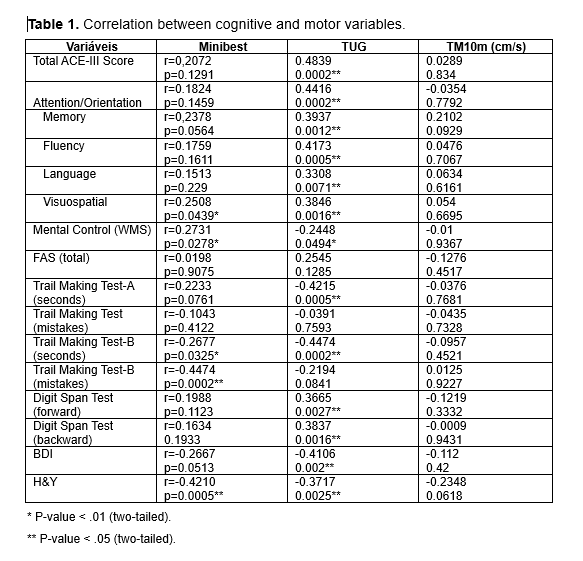Session Information
Date: Wednesday, September 25, 2019
Session Title: Cognition and Cognitive Disorders
Session Time: 1:15pm-2:45pm
Location: Agora 3 East, Level 3
Objective: To investigate the relationships between cognitive ability (global and single domain-executive functions) and gait performance (balance, gait speed and mobility) in patients with Parkinson’s Disease (PD) who attended to a hospital neurorehabilitation program.
Background: In addition to motor symptoms, about 25% of newly diagnosed PD suffers present with cognitive deficits [1,2]. Changes in gait may be associated with cognitive impairment, frequently involving executive functions, and slow speed predicts cognitive impairment and dementia [3,4]. Cross-sectional studies show an association between decline in mental flexibility and inhibitory control with reduced gait speed and falls, as well as divided attention deficit and difficulty to initiate gait [5,6,7].
Method: The study was cross-sectional. Descriptive and inferential statistics (Pearson’s correlation) were used for data analysis. The cognitive functions were evaluated through Digit Span Test, Trail A and B Test, Mental Control, Phonemic Verbal Fluency Task and total and indices Addenbrooke’s Cognitive Examination III score. The motor function was assessed through 10-meter walk test, Mini BESTest and Timed Up and Go Test.
Results: A total of 65 patients were included in this study. Of these, 66.15% were males, mean age was 61.14 (8.39) years, mean educational were 12 (8) years, disease progression time was 5.45 (4.37) years. 64.61% were in stages I and II of the Hoehn & Yahr stage. The correlation analyses showed that balance skills are significantly correlated with ability to switch attention between two tasks and visuospatial function. Furthermore, function mobility showed significant correlation with all cognitive tests. No correlations were observed with gait speed test.This study showed a significant correlation between measures of attention, mental flexibility and operational memory with functional motor mobility [table 1].
Conclusion: Data suggest the importance of the aspects of switch attention and mental flexibility in gait, evidencing the greater difficulty for double tasks. These findings might help early identification of cognitive deficits or motor dysfunctions in patients with PD who may benefit from rehabilitative strategies. Future prospective studies, with larger samples and other motor variables related to gait and falls, are needed to strengthen our results.
References: 1. Bocanegra Y, Trujillo-Orrego N, Pineda D. [Dementia and mild cognitive impairment in Parkinson’s disease: a review]. Rev Neurol. 2014;59(12):555–69. 2. Barbosa AF, Souza C de O, Chen J, Francato DV, Caromano FA, Chien HF, et al. The competition with a concurrent cognitive task affects posturographic measures in patients with Parkinson disease. Arq Neuropsiquiatr. 2015 Nov;73(11):906–12. 3. Savica R, Wennberg AM V, Hagen C, Edwards K, Roberts RO, Hollman JH, et al. Comparison of Gait Parameters for Predicting Cognitive Decline: The Mayo Clinic Study of Aging. J Alzheimer’s Dis. 2017;55(2):559–67. 4. Burn DJ, Rowan EN, Allan LM, Molloy S, O’Brien JT, McKeith IG. Motor subtype and cognitive decline in Parkinson’s disease, Parkinson’s disease with dementia, and dementia with Lewy bodies. J Neurol Neurosurg Psychiatry. 2006. May;77(5):585–9. 5. Arie L, Herman T, Shema-Shiratzky S, Giladi N, Hausdorff JM. Do cognition and other non-motor symptoms decline similarly among patients with Parkinson’s disease motor subtypes? Findings from a 5-year prospective study. J Neurol. 2017. 6. Yao, Yuan Shao, Xiang Han. Freezing of gait is associated with cognitive impairment in patients with Parkinson disease. Neuroscience Letters. 2017. 656:126–130. 7. Pigott K, Rick J, Xie SX, Hurtig H, Chen-Plotkin A, Duda JE, et al. Longitudinal study of normal cognition in Parkinson disease. Neurology. 2015 Oct 13;85(15):1276–82.
To cite this abstract in AMA style:
N. Sousa, R. Macedo, S. Brucki. Relationship between cognitive performance and mobility in patients with Parkinson´s disease: A cross-sectional study [abstract]. Mov Disord. 2019; 34 (suppl 2). https://www.mdsabstracts.org/abstract/relationship-between-cognitive-performance-and-mobility-in-patients-with-parkinsons-disease-a-cross-sectional-study/. Accessed April 22, 2025.« Back to 2019 International Congress
MDS Abstracts - https://www.mdsabstracts.org/abstract/relationship-between-cognitive-performance-and-mobility-in-patients-with-parkinsons-disease-a-cross-sectional-study/

